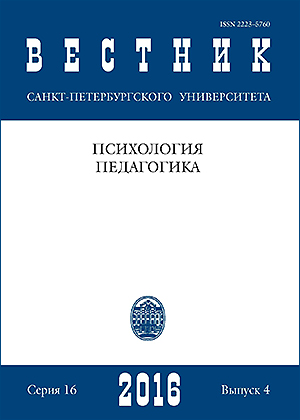Имплицитное научение в условии диадного взаимодействия
DOI:
https://doi.org/10.21638/11701/spbu16.2016.406Аннотация
Изучалос ь влияние диадного взаимодействия на применение имплицитных знаний в за-даче перцептивной категоризации. На первом этапе участники выполняли задачу по запоми-нанию изображений из целевой категории, а на втором и третьем этапах классифицировали новые стимулы. В диадном условии второй этап выполнялся в паре с другим участником, а третий — индивидуально. В индивидуальном условии участники самостоятельно проходили все три этапа. Имплицитные знания проявились в обоих условиях, но их устойчивость во времени была выше после работы в парах. Уровень осведомленности о неявной закономерности в обоих условиях оказался крайне низким, однако участники диад упоминали меньше нерелевантных характеристик стимулов в качестве значимых в постэкспериментальном опросе. Полученные результаты свидетельствуют о том, что диадное взаимодействие способствует применению имплицитных знаний.
Ключевые слова:
имплицитное научение, перцептивная категоризация, вербализация, диадное взаимодействие, групповые суждения, социальная верификация
Скачивания
Библиографические ссылки
References
Загрузки
Опубликован
Как цитировать
Выпуск
Раздел
Лицензия
Статьи журнала «Вестник Санкт-Петербургского университета. Психология» находятся в открытом доступе и распространяются в соответствии с условиями Лицензионного Договора с Санкт-Петербургским государственным университетом, который бесплатно предоставляет авторам неограниченное распространение и самостоятельное архивирование.




